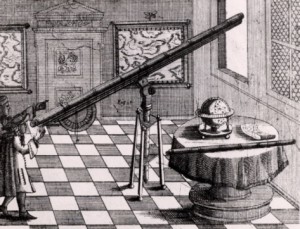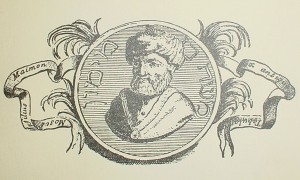Religious Tolerance to Science, a Comparison
By Nir Menussi: February 25, 2011: Category Inspirations, Networks of Meaning
Integrating Science and Mysticism, Article 8
 We spoke of the disillusionment of science as a harbinger of secular salvation, and said it could be described as a growing realization that science should resume its role as “handmaid of theology”, just not Christian theology. We proposed that instead, it should be incorporated into the worldview of Torah, as passed down by Judaism.
We spoke of the disillusionment of science as a harbinger of secular salvation, and said it could be described as a growing realization that science should resume its role as “handmaid of theology”, just not Christian theology. We proposed that instead, it should be incorporated into the worldview of Torah, as passed down by Judaism.
But why should Judaism treat science better than historical Christianity did? [Editor’s note: For the purposes of this article, the focus is on general ‘normative’ tendencies of historical Christianity. There is no intent to summarize all of the modern streams of Christian thought and belief which have adopted more diversified approaches to science and a host other issues.] We claim there are two main reasons for this: (a) that Judaism is inherently more tolerant to science than historical Christianity; and (b) that it is not a coercive subjugation of science to Judaism that we ultimately want, but a voluntary and egalitarian integration of the two, better described as a sort of ‘marriage’.
In this article we address the first of these reasons – the crucial differences between Judaism and historical Christianity and how they bear on their degree of tolerance towards science. We’ll explore the second reason in subsequent articles.
Taking Apart Judeo-Christianity
It has become customary to speak of a “Judeo-Christian” tradition, a general term invented to refer to the historical influence Judaism and Christianity have had together upon the West and the world in general. The term emphasizes the common denominator of both religions, stressed against the background of other cultures, notably paganism and Eastern religions.
While it is true that because Christianity branched out of Judaism it shares many of its ideas, principles and images, it should be made clear that the concept “Judeo-Christianity” is really a Christian notion. Although the nineteenth century intellectuals who coined it were mostly secular, they all came from a Christian background, and were therefore heavily influenced by Christian concepts. Christianity always perceived itself as being the continuation of Judaism, and claimed it has preserved all of its essential elements, shedding only incidental ones. The term “Judeo-Christian”, in which Judaism is relegated to adjective while Christianity merits being the noun, perfectly reflects this.
In truth, not only are there essential aspects to Judaism that historical Christianity neglected, but these aspects are embedded in the very heart of the Torah. They have far-reaching implications as to the basic stance from which the two religions approach science and can integrate with it.
 Resignation vs. Sanctification
Resignation vs. Sanctification
The first and foremost quality that distinguishes Judaism from historical Christianity is its approach to the material world. From its earliest beginnings, historical Christianity advocated a radically ascetic lifestyle, preaching for the renouncing of all worldly goods. While the principle of rising above material needs and desires, and seeing them as lowly compared to the soul and “the world to come” certainly exists in Judaism (and is, indeed, where Christianity took it from), it is balanced by the fact that one’s main religious goal is not to retire from this world but to sanctify it—to transform it, by fulfilling the commandments, so that it mirrors, even houses, the Divine. In fact, according to Judaism the whole purpose of distancing one’s self from the physical world is to return to it from a higher stance and to sanctify it. Historical Christianity, perhaps inspired by the ascetic philosophies of Hellenism, forsook this careful balance and treated this world as a mere external shell from which we are to escape.
Nowhere is this more strongly illustrated than in the fact that, according to the New Testament, one’s highest aspiration should be to lead a life of complete sexual abstinence, never marrying, and only if one fails to do so should one take a wife. In sharp contrast, in Judaism a vital part of every man’s religious duty is to marry and raise a family. It should be well considered that not one of the Church fathers ever married or raised children, while all but one of the Rabbinical sages married and raised children (the single one who didn’t, Ben Azai, claimed he absolutely could not forsake the Torah for even an instant, and that in cases such as his it was permissible not to marry; this was accepted for a while but was eventually abandoned in Jewish law). While historical Christianity is based on a belief that physical relationships are detrimental to serving God, Judaism believes they are an essential part of it.
These two distinct approaches to the material world endow Judaism and historical Christianity with innately very different degrees of openness to physical, empirical science. Whereas the latter is inherently more reluctant towards it, the former is inherently more receptive to it.
Seventy Faces
Another important point of difference between Judaism and historical Christianity, closely connected to the previous one, is the way they treat conflicting theoretical notions about the world, whether contradictory to one another or to the Bible.
Once historical Christianity abandoned the practical commandments so central to Judaism, its method of determining whether one is truly a Christian was based on beliefs. What you did was no longer what mattered most; it was what you believed that counted. From that point on, the idea of articles of faith—statements about the nature of reality that one is obligated to believe in—and later, dogma, assumed a major role in historical Christianity. Rejecting articles of faith was the ultimate heresy, and so believing them, and making sure others believe in them, was of the ultimate importance.
 In Judaism the situation has always been very different. Although it obviously has certain core beliefs upheld by all—like that the universe was created God and that the Torah is God-given—the importance they bear does not come near to Christianity. In fact, there has never been a fully accepted set of beliefs all Jews can call their ‘credo’ (Maimonides’ set of 13 principles, formulated in the 12th century, comes closest, but the fact that it took so long to appear, and that it is not without criticism, testifies that Judaism is not at all dependent on it). What ultimately determines if you are a religious Jew or not, is whether you actually observe the commandments. Doing the deeds, “putting your money where your mouth is”, is what proves you truly care about your faith, not your assumed state of heart—which is ungraspable, complex, evolving and has many ups and downs.
In Judaism the situation has always been very different. Although it obviously has certain core beliefs upheld by all—like that the universe was created God and that the Torah is God-given—the importance they bear does not come near to Christianity. In fact, there has never been a fully accepted set of beliefs all Jews can call their ‘credo’ (Maimonides’ set of 13 principles, formulated in the 12th century, comes closest, but the fact that it took so long to appear, and that it is not without criticism, testifies that Judaism is not at all dependent on it). What ultimately determines if you are a religious Jew or not, is whether you actually observe the commandments. Doing the deeds, “putting your money where your mouth is”, is what proves you truly care about your faith, not your assumed state of heart—which is ungraspable, complex, evolving and has many ups and downs.
This has a far-reaching implication: it means that regarding your beliefs and opinions, an incredible degree of liberty exists in Judaism. “The Torah has seventy faces”: it can be, and constantly is being, interpreted in a multitude of ways, many of them mutually exclusive. Deciding what is or isn’t a valid interpretation is not totally arbitrary, not everything goes; but the theoretical dimension of the Torah is a radically flexible one, open to and encouraging debates between interpretations.
What this means is that Torah can, without timidity, contain and reflect upon any scientific proposition whatsoever (provided it is truly scientific, not science-produced dogma), even if it seems to contradict it. When the legs you stand on are made of dogmatic principles of faith, every conflicting proposition that breezes by threatens to knock you off your feet; but when your legs are made of solid deeds, conflicting propositions don’t shake you one bit, and instead become what they should be: refreshing wind which you can inhale and reflect upon calmly and open-mindedly.
It is this trait, above all, that promises Judaism will be an altogether more tolerant and appreciative companion to science than historical Christianity was.
http://www.interinclusion.org/inspirations/from-handmaid-to-wife/























;)
;)
;)
;)
;)
;)
;)
;)
;)
;)
